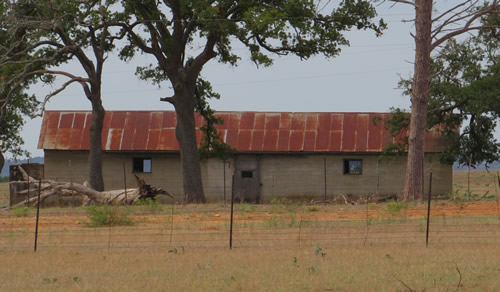Books by
Michael Barr
Order Here: |
|
The
story of wine began before recorded history. It is probably the oldest
drink on the planet - next to water.
Even in the Texas
Hill Country crushing grapes and making wine are not new skills
but have been practiced on a small scale since the first settlers
came to the Pedernales Valley. The first sprouts of the commercial
wine industry in Gillespie
County date to at least the early 20th century.
Ludwig Vorauer brought his talents as a winemaker and nurseryman from
Reid, Austria to Gillespie
County in 1913. He and his wife Lina settled on a small place
3 miles east of Fredericksburg
on Cave Creek Road.
He first tried cotton farming,
but WWI caused the bottom
to fall out of the cotton market. He did a little better raising peanuts.
He and some of his neighbors shipped what some say was the first carload
of peanuts from Gillespie
County.
A nurseryman at heart, Vorauer spent every spare moment in his nursery
and his vineyard. He raised pecan trees, various kinds of fruit trees,
shade trees, evergreens, palms, weeping willows, flowering shrubs
and hedge plants. He planted his first grape vines in 1913.
Ludwig Vorauer, as it turned out, had a green thumb all the way up
to the elbow. He soon quit farming, devoting all of his time and energy
to his nursery and vineyard.
His secret weapon for growing trees was fertilizer. He used guano
from a nearby bat cave to fertilize his fruit trees, while hog manure
was the fertilizer of choice for pecan trees.
Prohibition put a cork in the American wine industry from 1920 to
1933 even though there was little support for that particular law
in these parts. (Local legend says "The cow's in the corn" was code
from the Gillespie County Sheriff's Office that federal agents were
poking around the neighborhood.)
With the winery business all bottled up, Ludwig Vorauer concentrated
on his nursery, selling small pecan trees for 75 cents each and small
peach trees for $3 a dozen.
Just like Sears and Roebuck, Vorauer had a catalog and a mail order
business. He shipped trees all over the country.
His
winery and vineyard, called the Texas Winery, took off after
the repeal of Prohibition. Vorauer's wines, advertised as the "Pride
of Fredericksburg," included Burgundy, Sherry and Blackberry. He also
made Sauterne (a sweet white wine) and Tokay (another sweet white
wine) named for the Tokaj (pronounced Tok?) region of Hungary.
|
 |
The Wine House
- the only building left at Texas Winery.
Photo by Michael
Barr, August 2022 |
The winery business
was hard work, especially at harvest time. The family would pick grapes
during the day and crush the grapes at night. Before electricity came
in 1940, the crusher had to be cranked by hand.
By 1937 Vorauer's Texas Winery was one of 5 registered wineries in
the state. At the time Texas Winery was believed to be the largest
vineyard and winery combination in Texas.
Then in October 1937 Ludwig Vorauer fell off the bumper of his truck
while repairing his private telephone line. He died from his injuries
a few days later.
When Ludwig died his son Carl, wife Lina, daughter Freida and son
Max ran the business until it closed in1956. |
A bottle of Ludwig Vorauer's wine
Courtesy Herb Vorauer.
Photo by Michael
Barr, August 2022 |
Still
the Pecan Belt Nursery left a lasting mark on the Hill
Country. Some of the century-old pecan trees we see today in Fredericksburg
may have sprouted in Ludwig Vorauer's nursery, and he likely supplied
trees for some of the early peach orchards.
The Fredericksburg Standard (May 1, 1946) described Vorauer's
nursery as "instrumental in the wide adoption of fruit growing in
the county."
His winery established Gillespie
and surrounding counties as wine country. When discussing the future
of the Hill Country wine business back in 1964, Victor Nixon and his
father-in-law B. L. Enderle reminded a Harper Herald reporter
that the groundwork had already been done.
"Ludwig Vorauer and son Carl at one time had a big vineyard and winery
out on the Burnet Road," Nixon recalled, "and they were quite successful
at growing a variety of grapes."
In 1937 the Texas Winery was one of 5 registered wineries in Texas.
Today, just in the Hill
Country, there are over 50 wineries and counting. |
Sources:
"Delicious Wines Thoroughly Aged, From Choice Grapes, are Featured
By Vorauer," Fredericksburg Standard, March 18, 1937.
"Suffers Fatal Injuries in Fall From Ladder," Fredericksburg Standard,
October 21, 1937.
"Pecan Belt Nursery Founded Here By Ludwig Vorauer," Fredericksburg
Standard, May 1, 1946.
"Making 100 Acres of Texas Land Worth $75,000," Tulia Herald,
April 12, 1928.
"On Range and Field," Harper Herald, May 15, 1964. |
|
|
